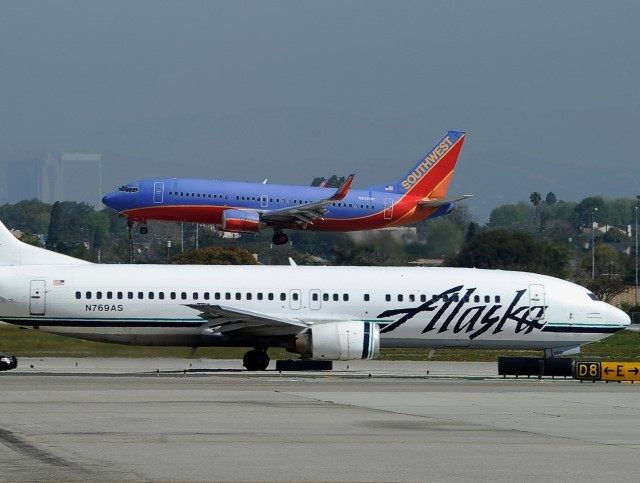A pending merger between Alaska Airlines and Virgin America promises to challenge Texas-based Southwest Airlines’ (NYSE: LUV) efforts to dominate west coast markets as the industry continues the trend toward increased consolidation. The merger would create the fifth largest airline in the United States.
Seattle-based Alaskan Air Group’s (NYSE: ALK) latest growth move to compete with the larger carriers totaled roughly $4 billion at $57.00 per share in cash, according to a company announcement circulated Monday. The airline touted new service in 20 markets and 10 cities in 2015 prior to sealing its latest deal. Unlike several airline mergers prior, Alaska’s executives argue the move was made from “a place of strength,” according to the Dallas Morning News. The agreement, pending stockholder and U.S. Department of Justice review, would offer roughly 1,200 daily departures; serviced by 280 aircraft each aged an average eight years old.
The pending merger would bring a whole new level of competition for the most prized state, California, by passenger volume. Alaska’s hubs in Seattle, Portland, San Francisco and Los Angeles would be quickly bolstered by Virgin America’s (NASDAQ: VA) existing infrastructure and routes in southern and northern California. The duo’s reputation for affordable airfare and focus on customer service would not be the only dimension of competition for airlines like Dallas-based Southwest.
Recent reports offered in the Dallas paper and figures published by Southwest demonstrate the carrier’s extensive investments to dominate the Golden State. Southwest is already offering more departures daily than any other airline in the region — with new routes scheduled between Long Beach and Oakland beginning in June, according to a recent release. By the summer, Californians will be able to board a Southwest flight at 10 airports in the state. In return, Alaska is expected to assume two valuable gates in Southwest’s home airport, Love Field. One advantage the merged airline would hold over Southwest is the network of subsidiaries that connect smaller western market airfields to Alaska’s larger cities – which would be a total impracticality for Southwest’s uniform fleet of Boeing 737s.
Airline industry experts like FareCompare expect added competition from the merger to provide a drop in airfare, but continued consolidation will ultimately raise prices in the long run, according to recent analysis.
Thanks to a variety of carrier mergers, roughly 85 percent of America’s commercial air traffic is produced by only four companies: Ft. Worth-based American, Delta, United and Southwest. The Dallas carrier successfully completed its four year merger with AirTran Airways in late 2014 and was already rumored to assume another carrier beginning in 2015, according to the Business Journal. No formal announcements have been made to date. The previous moves did; however, carry Southwest into international routes and the airline currently has an application before the U.S. Department of Transportation to establish service between three Florida airports and Cuba.
Logan Churchwell is a founding member of the Breitbart Texas team. You can follow him on Twitter @LCChurchwell.

COMMENTS
Please let us know if you're having issues with commenting.